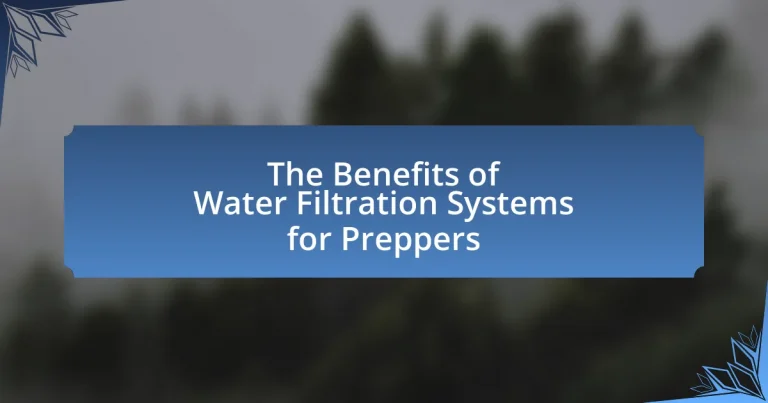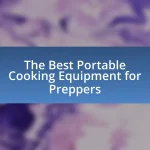Water filtration systems are essential devices that remove impurities and contaminants from water, ensuring it is safe for consumption, particularly for preppers who rely on them during emergencies when traditional water supplies may be compromised. The article outlines the functionality of these systems, including key components and various filtration methods, emphasizing their effectiveness in eliminating harmful substances such as bacteria, viruses, and chemicals. It also discusses the specific benefits for preppers, the importance of maintenance, and the factors influencing system selection based on water sources. Additionally, the article compares filtration systems to other purification methods, highlighting their advantages and limitations, while providing practical tips for maximizing their effectiveness in survival scenarios.
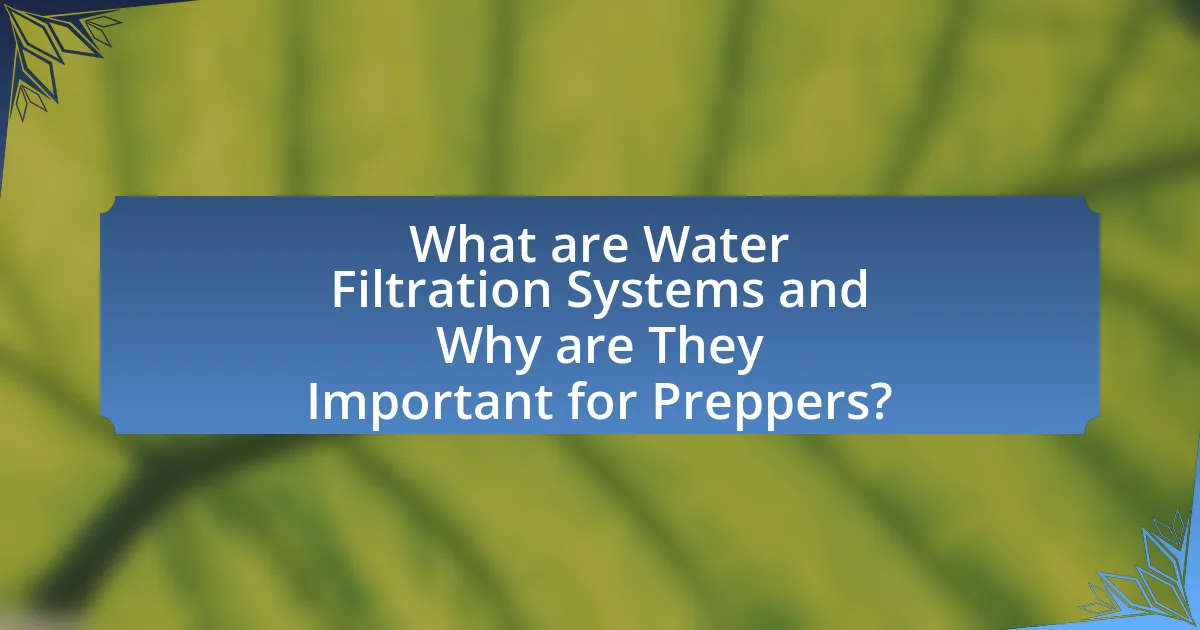
What are Water Filtration Systems and Why are They Important for Preppers?
Water filtration systems are devices designed to remove impurities and contaminants from water, ensuring it is safe for consumption. For preppers, these systems are crucial because they provide a reliable source of clean water during emergencies or disasters when municipal supplies may be compromised. The importance of water filtration systems is underscored by the fact that contaminated water can lead to serious health issues, including waterborne diseases. According to the World Health Organization, approximately 2 billion people globally lack access to safe drinking water, highlighting the necessity for effective filtration solutions in survival scenarios.
How do Water Filtration Systems function?
Water filtration systems function by removing impurities and contaminants from water through various physical and chemical processes. These systems typically utilize multiple stages of filtration, including sediment filters to capture larger particles, activated carbon filters to absorb chemicals and odors, and membrane filters, such as reverse osmosis, to eliminate smaller contaminants like bacteria and viruses. For instance, reverse osmosis can remove up to 99% of dissolved solids, making it highly effective for producing clean drinking water.
What are the key components of a water filtration system?
The key components of a water filtration system include a pre-filter, a filtration medium, a post-filter, and a storage tank. The pre-filter removes larger particles and sediments, protecting the main filtration medium from clogging. The filtration medium, often made of activated carbon or ceramic, effectively removes contaminants such as bacteria, viruses, and chemicals from the water. The post-filter further polishes the water, ensuring any remaining impurities are eliminated before storage. Finally, the storage tank holds the purified water for use. These components work together to ensure safe and clean drinking water, which is essential for preppers in emergency situations.
How do different filtration methods impact water quality?
Different filtration methods significantly impact water quality by varying their effectiveness in removing contaminants. For instance, activated carbon filters excel at reducing chlorine, sediment, and volatile organic compounds, thereby improving taste and odor. In contrast, reverse osmosis systems can remove a broader range of impurities, including heavy metals, salts, and microorganisms, resulting in purer water. Studies indicate that reverse osmosis can eliminate up to 99% of total dissolved solids, making it one of the most effective filtration methods available. Additionally, UV filtration systems target pathogens, ensuring microbiological safety without adding chemicals. Each method’s unique capabilities directly influence the overall safety and palatability of drinking water, highlighting the importance of selecting the appropriate filtration system based on specific water quality needs.
What specific benefits do Water Filtration Systems provide for Preppers?
Water filtration systems provide preppers with access to clean and safe drinking water, which is essential for survival during emergencies. These systems effectively remove contaminants such as bacteria, viruses, heavy metals, and chemicals from water sources, ensuring that the water is potable. For instance, studies show that advanced filtration systems can eliminate up to 99.99% of pathogens, making them crucial for maintaining health in crisis situations. Additionally, water filtration systems are often portable and can be used in various environments, allowing preppers to secure water from natural sources like rivers or lakes when municipal supplies are compromised.
How do these systems ensure access to clean water during emergencies?
Water filtration systems ensure access to clean water during emergencies by removing contaminants and pathogens from available water sources. These systems utilize various technologies, such as activated carbon filters, reverse osmosis, and UV purification, to effectively eliminate harmful substances. For instance, studies show that activated carbon filters can reduce chlorine, sediment, and volatile organic compounds, while reverse osmosis systems can remove up to 99% of bacteria and viruses. This capability is crucial during emergencies when traditional water supplies may be compromised, ensuring that individuals have access to safe drinking water.
What role do water filtration systems play in long-term survival planning?
Water filtration systems are essential for long-term survival planning as they ensure access to clean and safe drinking water. In survival scenarios, contaminated water sources can lead to serious health risks, including waterborne diseases. Filtration systems effectively remove harmful pathogens, chemicals, and particulates, making water safe for consumption. For instance, studies show that advanced filtration systems can eliminate up to 99.99% of bacteria and viruses, significantly reducing the risk of illness. Therefore, incorporating water filtration systems into survival strategies is crucial for maintaining health and hydration over extended periods.
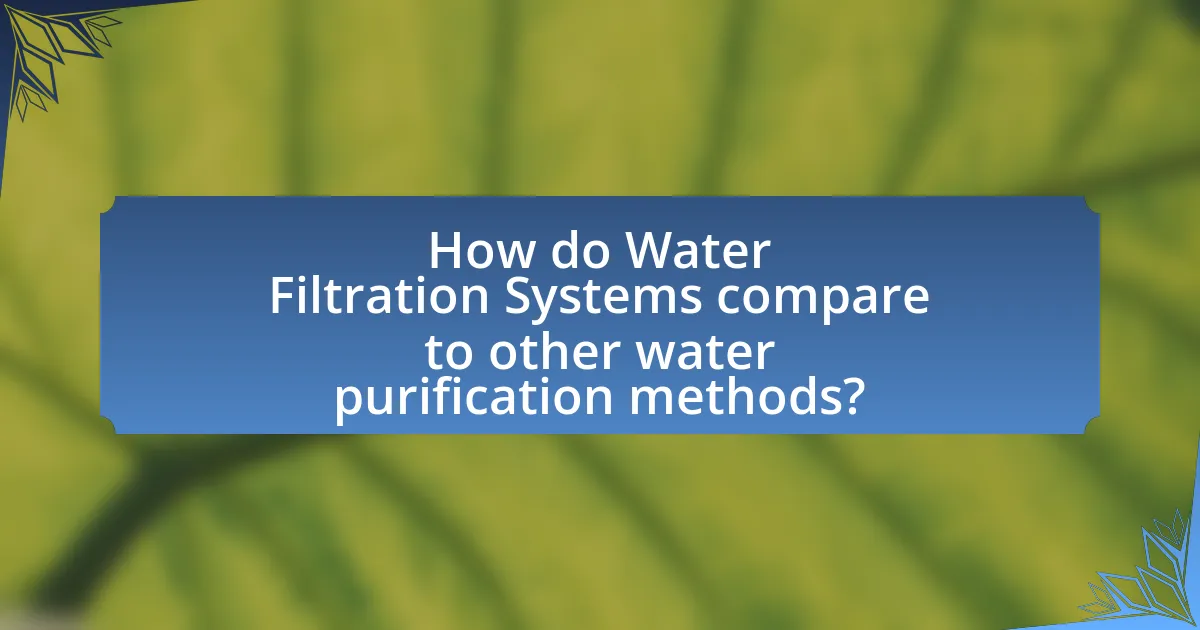
How do Water Filtration Systems compare to other water purification methods?
Water filtration systems are generally more effective at removing particulate matter and certain contaminants compared to other water purification methods like boiling or chemical disinfection. Water filtration systems utilize physical barriers, such as activated carbon or ceramic filters, to trap impurities, while boiling kills pathogens but does not remove chemical contaminants. For instance, studies show that activated carbon filters can reduce chlorine, sediment, and volatile organic compounds, making them superior for improving taste and safety. In contrast, chemical methods may leave residual chemicals in the water, which can be undesirable. Thus, water filtration systems provide a comprehensive solution for ensuring clean drinking water, particularly important for preppers who prioritize reliability and safety in emergency situations.
What are the advantages of using filtration over boiling or chemical treatments?
Filtration offers several advantages over boiling or chemical treatments for water purification. Firstly, filtration effectively removes a wide range of contaminants, including sediments, bacteria, viruses, and chemicals, without altering the water’s taste or odor. In contrast, boiling requires energy and time, and while it kills pathogens, it does not remove chemical pollutants. Additionally, chemical treatments, such as chlorine or iodine, can leave residual tastes and may not eliminate all contaminants, particularly certain parasites and heavy metals. Filtration systems, particularly those with activated carbon and ceramic elements, can provide immediate access to clean water, making them more convenient for preppers who need reliable and quick purification methods in emergency situations.
How does the cost of water filtration systems compare to other methods?
Water filtration systems generally have a higher upfront cost compared to other methods such as boiling or chemical treatment. For instance, a basic water filtration system can range from $50 to $500, while boiling water requires only a heat source and time, and chemical treatments like chlorine tablets cost around $0.10 to $0.50 per treatment. However, filtration systems provide long-term savings and convenience, as they can filter large volumes of water over time, whereas boiling and chemical methods may be less efficient for ongoing use. Additionally, filtration systems often remove a broader range of contaminants, enhancing water safety and quality, which is crucial for preppers who prioritize reliable access to clean water.
What are the limitations of water filtration systems?
Water filtration systems have several limitations, including their inability to remove all contaminants, dependence on maintenance, and potential for bacterial growth. Many filtration systems, such as activated carbon filters, can effectively reduce chlorine and sediment but may not eliminate heavy metals, viruses, or certain chemicals. Additionally, regular maintenance is crucial; failure to replace filters can lead to reduced efficacy and contamination. Furthermore, stagnant water in filtration systems can foster bacterial growth, posing health risks. These limitations highlight the need for comprehensive water treatment solutions in prepping scenarios.
What types of water filtration systems are available for Preppers?
Preppers have access to several types of water filtration systems, including gravity filters, pump filters, and UV light purifiers. Gravity filters, such as the Berkey system, utilize gravity to pull water through a series of filters, effectively removing bacteria and contaminants. Pump filters, like the Katadyn Pocket, require manual pumping to filter water, making them suitable for outdoor use and emergency situations. UV light purifiers, such as the SteriPEN, use ultraviolet light to kill pathogens in water, providing a quick and effective solution for disinfection. Each of these systems is designed to ensure safe drinking water in various scenarios, making them essential for preparedness.
What are the differences between portable and stationary filtration systems?
Portable filtration systems are designed for mobility and convenience, allowing users to filter water on-the-go, while stationary filtration systems are fixed installations that provide continuous filtration at a specific location. Portable systems typically include lightweight, compact designs suitable for outdoor activities or emergency situations, whereas stationary systems are often larger, more complex, and capable of handling higher volumes of water, making them ideal for home or community use. The effectiveness of both types can vary based on their filtration technology, with portable systems often utilizing gravity or pump mechanisms, while stationary systems may incorporate advanced filtration methods like reverse osmosis or multi-stage filtration.
How do gravity-fed systems differ from pump-based systems?
Gravity-fed systems rely on the force of gravity to move water through the filtration process, while pump-based systems use mechanical pumps to facilitate water flow. In gravity-fed systems, water is typically stored in an elevated tank, allowing it to flow downwards through filters due to gravitational pull, which requires no external energy source. In contrast, pump-based systems actively draw water from a source and push it through the filtration system, necessitating electricity or manual effort to operate the pump. This fundamental difference affects the efficiency, energy requirements, and maintenance of each system, with gravity-fed systems generally being simpler and more reliable in remote or off-grid situations.
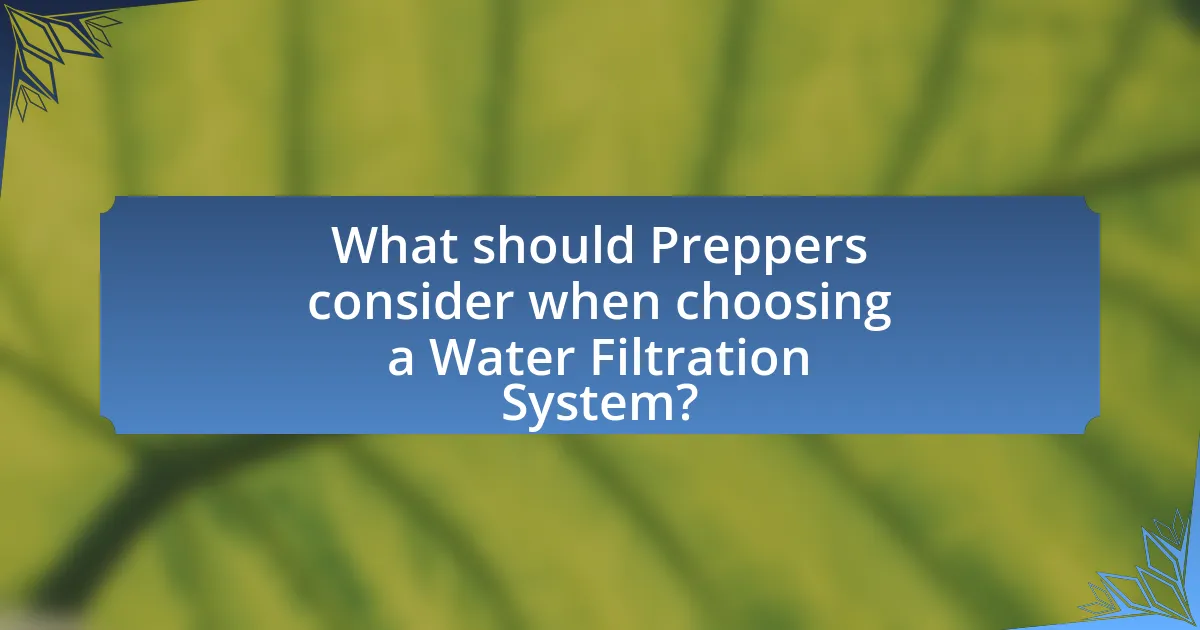
What should Preppers consider when choosing a Water Filtration System?
Preppers should consider the filtration system’s effectiveness in removing contaminants, including bacteria, viruses, and heavy metals. A system that meets EPA standards for water purification, such as those certified by NSF International, ensures that it can effectively eliminate harmful substances. Additionally, the flow rate and capacity of the filtration system are crucial; systems with higher flow rates can provide more water in less time, which is essential during emergencies. Portability is another factor, as lightweight and compact systems are easier to transport in survival situations. Lastly, the ease of maintenance and replacement of filters should be evaluated, as this impacts long-term usability and reliability.
What factors influence the effectiveness of a water filtration system?
The effectiveness of a water filtration system is influenced by several key factors, including the type of filter media used, the size of the filter pores, the flow rate of water through the system, and the specific contaminants present in the water. The type of filter media, such as activated carbon or ceramic, determines the range of contaminants that can be removed; for instance, activated carbon is effective for organic compounds and chlorine, while ceramic filters can remove bacteria and protozoa. The size of the filter pores is critical, as smaller pores can trap smaller particles and pathogens, enhancing purification. The flow rate affects how quickly water can be filtered; a slower flow rate often allows for more thorough filtration. Lastly, the specific contaminants in the water, such as heavy metals, bacteria, or sediment, dictate the necessary filtration technology to ensure effective removal.
How does the source of water affect filtration system selection?
The source of water significantly influences the selection of filtration systems due to varying contaminants and characteristics present in different water sources. For instance, surface water, such as rivers and lakes, often contains organic matter, sediments, and microorganisms, necessitating a filtration system that can effectively remove these impurities, such as a multi-stage filter or UV purifier. Conversely, groundwater may have higher levels of minerals and heavy metals, requiring a filtration system equipped with reverse osmosis or activated carbon filters to address these specific contaminants. Studies indicate that the effectiveness of a filtration system is directly correlated with the specific contaminants found in the water source, emphasizing the need for tailored filtration solutions based on water origin.
What maintenance requirements should be considered?
Regular maintenance of water filtration systems is essential to ensure optimal performance and safety. Key maintenance requirements include replacing filters according to the manufacturer’s recommendations, typically every 6 to 12 months, depending on usage and water quality. Additionally, inspecting and cleaning the system components, such as the housing and any pre-filters, helps prevent clogs and bacterial growth. Monitoring water flow rates can also indicate when maintenance is needed, as a significant drop may signal a clogged filter. Following these maintenance practices ensures the filtration system effectively removes contaminants, providing safe drinking water for preppers.
How can Preppers maximize the benefits of their Water Filtration Systems?
Preppers can maximize the benefits of their water filtration systems by regularly maintaining and testing the systems to ensure optimal performance. Regular maintenance, such as cleaning filters and replacing them as needed, enhances the system’s efficiency and longevity. Testing the water quality before and after filtration confirms the system’s effectiveness in removing contaminants, which is crucial for ensuring safe drinking water. According to the Environmental Protection Agency (EPA), proper maintenance can improve filtration efficiency by up to 50%, significantly reducing health risks associated with contaminated water.
What best practices should be followed for system maintenance?
Regular system maintenance should include routine inspections, timely software updates, and consistent performance monitoring. Routine inspections help identify potential issues before they escalate, ensuring the system operates efficiently. Timely software updates are crucial as they often contain security patches and performance improvements, which protect the system from vulnerabilities. Consistent performance monitoring allows for the detection of anomalies, enabling proactive measures to maintain optimal functionality. These practices are supported by industry standards, such as the National Institute of Standards and Technology guidelines, which emphasize the importance of regular maintenance for system reliability and security.
How can Preppers ensure their filtration systems are ready for emergencies?
Preppers can ensure their filtration systems are ready for emergencies by regularly testing and maintaining the equipment. Regular maintenance includes cleaning filters, replacing cartridges as needed, and checking for any damage or wear that could compromise functionality. According to the Environmental Protection Agency, proper maintenance of water filtration systems can significantly enhance their effectiveness and reliability during emergencies, ensuring access to safe drinking water.
What common troubleshooting tips exist for Water Filtration Systems?
Common troubleshooting tips for water filtration systems include checking for clogs, ensuring proper installation, and replacing filters regularly. Clogs can occur due to sediment buildup, which can be resolved by cleaning or replacing the filter. Proper installation is crucial; if the system is not set up according to the manufacturer’s instructions, it may not function effectively. Regular filter replacement is essential, as filters have a lifespan that, if exceeded, can lead to reduced water quality and flow. Following these tips can help maintain the efficiency and effectiveness of water filtration systems.
